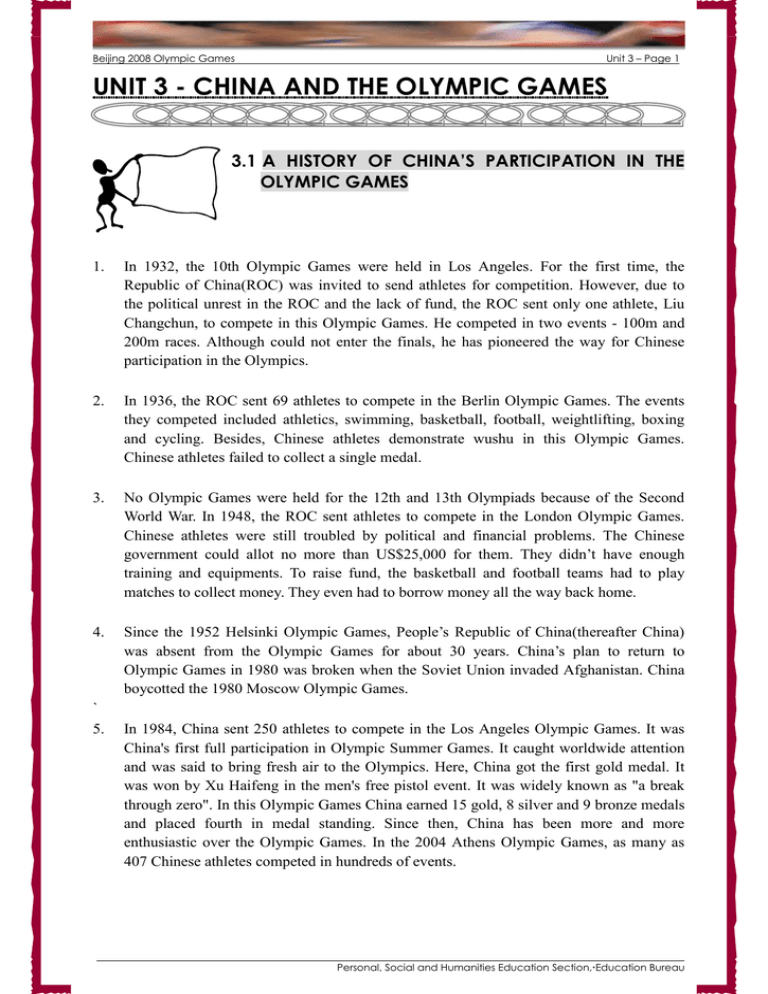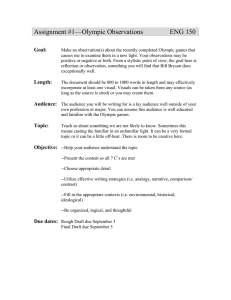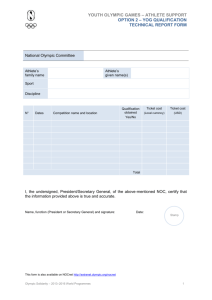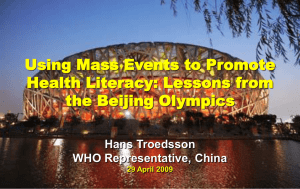unit 3 og s1-3 eng
advertisement

Beijing 2008 Olympic Games Unit 3 – Page 1 UNIT 3 - CHINA AND THE OLYMPIC GAMES 3.1 A HISTORY OF CHINA’S PARTICIPATION IN THE OLYMPIC GAMES 1. In 1932, the 10th Olympic Games were held in Los Angeles. For the first time, the Republic of China(ROC) was invited to send athletes for competition. However, due to the political unrest in the ROC and the lack of fund, the ROC sent only one athlete, Liu Changchun, to compete in this Olympic Games. He competed in two events - 100m and 200m races. Although could not enter the finals, he has pioneered the way for Chinese participation in the Olympics. 2. In 1936, the ROC sent 69 athletes to compete in the Berlin Olympic Games. The events they competed included athletics, swimming, basketball, football, weightlifting, boxing and cycling. Besides, Chinese athletes demonstrate wushu in this Olympic Games. Chinese athletes failed to collect a single medal. 3. No Olympic Games were held for the 12th and 13th Olympiads because of the Second World War. In 1948, the ROC sent athletes to compete in the London Olympic Games. Chinese athletes were still troubled by political and financial problems. The Chinese government could allot no more than US$25,000 for them. They didn’t have enough training and equipments. To raise fund, the basketball and football teams had to play matches to collect money. They even had to borrow money all the way back home. 4. Since the 1952 Helsinki Olympic Games, People’s Republic of China(thereafter China) was absent from the Olympic Games for about 30 years. China’s plan to return to Olympic Games in 1980 was broken when the Soviet Union invaded Afghanistan. China boycotted the 1980 Moscow Olympic Games. ` 5. In 1984, China sent 250 athletes to compete in the Los Angeles Olympic Games. It was China's first full participation in Olympic Summer Games. It caught worldwide attention and was said to bring fresh air to the Olympics. Here, China got the first gold medal. It was won by Xu Haifeng in the men's free pistol event. It was widely known as "a break through zero". In this Olympic Games China earned 15 gold, 8 silver and 9 bronze medals and placed fourth in medal standing. Since then, China has been more and more enthusiastic over the Olympic Games. In the 2004 Athens Olympic Games, as many as 407 Chinese athletes competed in hundreds of events. Personal, Social and Humanities Education Section,Education Bureau Beijing 2008 Olympic Games Unit 3 – Page 2 6. Besides joining competition, China also bid twice to host the Olympic Games. China's Olympic bid intention dates back to 1908, when the Tianjin Youth magazine raised the questions “When can China host an Olympic Games?” In 1979, Chinese leader Deng Xiaoping pointed out that China would bid to host the Olympic Games when time was appropriate. In 1990, Beijing held the 11th Asian Games. It gained much valuable experience of hosting big sporting event. In 1991, Beijing started to bid the 2000 Olympic Games. However, Sydney beat Beijing and won the host of the 2000 Olympic Games. 7. In 1999, Beijing started to bid the 2008 Olympic Games. The motto of Beijing's bid was "New Beijing, Great Olympics", meaning that reform and opening up to the outside world have brought about great changes in Beijing, a city with a history of 3,000 years. In 2001, IOC declared that Beijing won the host of the 2008 Summer Olympic Games. Source : Official website of the Chinese Olympic Committee http://en.olympic.cn/games/ TO KNOW MORE …………… You may visit this website to watch videos about China’s participation in the Olympic Games: http://en.beijing2008.cn/video/historyv/index.shtml Team China (1) Team China (2) Team China (3) Personal, Social and Humanities Education Section,Education Bureau Beijing 2008 Olympic Games Unit 3 – Page 3 3.2 IMPORTANT FACTS ABOUT CHINA’S PARTICIPATION IN THE OLYMPIC GAMES 1. 2. 3. From Section 3.1, choose FIVE pieces of important fact about China’s participation in the Olympic Games. Put the facts and the years they happen in the timeline in Figure 1. Give reason(s) to explain why you think these five facts are more important than the others. Among these five facts, which one is the most important? Why do you think so? Figure 1 - Important years and facts about China’s participation in the Olympic Games 1932 1952 1984 1991 2008 1896 Year Fact 1932 Chinese athlete first competed in the Olympic Games. 1952 China stopped sending athlete compete in the Olympic Games. 1984 Reasons why they are important They indicate a change in the nature of China’s participation, while other facts may represent a change in the amount (e.g. China sent athletes to compete in the change in the number of Olympic Games again. athletes sent and events joined). to 1991 Beijing started to bid the host of the 2008 Olympic Games. 2008 The first time China hosts the Olympic Games. To most people, changes in nature are sharper and more important than changes in amount. (Answers for reference only) Personal, Social and Humanities Education Section,Education Bureau Beijing 2008 Olympic Games Unit 3 – Page 4 3.3 THE SLOGAN AND CONCEPTS OF THE BEIJING 2008 OLYMPIC GAMES 1. One slogan The slogan of the Beijing 2008 Olympic Games is "One World One Dream". It means "the whole Mankind lives in the same world and seeks for the same dream and ideal". In spite of the differences in skin colors, languages and races, people share the same Olympic spirits of Unity, Friendship, Progress, Harmony, Participation and Dream. ONE WORLD ONE DREAM Watch the promotional video “One World One Dream” in the official website of Beijing 2008 Olympic Games (http://en.beijing2008.cn/video/ promotional/). Use evidence in the video to tell why the Olympic Games are chances where “the whole Mankind lives in the same world and seeks for the same dream and ideal". Athletes from different countries compete in the same place. Spectators from different countries meet in the same place. People from different countries share the same feelings, e.g. the joy of winning, the sadness of failure, and the same goals, e.g. to win and to progress. Besides sports event, can you name another event which carries the spirit of “One World One Dream” as well? If yes, what is it? If no, why is it difficult? It’s difficult to give another example because: 1. Few things are cross-cultural like sports. 2. Few events are attended by most countries in the world. (The answers are for reference only) Personal, Social and Humanities Education Section,Education Bureau Beijing 2008 Olympic Games 2. Unit 3 – Page 5 Three concepts - The Beijing Olympic Games has three concepts -- "Green Olympics", "Hi-Tech Olympics" and "People’s Olympics". Which concept(s) do the following actions show? Put them in correct position in the Venn Diagram. A) Beijing has promoted social courtesy among the public. B) The Olympic Village relies on advanced technology to make use of the heat produced in the sewage treatment system. C) Solar power is used at several Beijing Olympic venues. D) Beijing has also established its first wind power plant. E) People of various social sectors took part in the selection of the Beijing 2008 Olympic emblem, mascots and slogan. F) Beijing authority has educated the spectators to be active and more knowledgeable about the sports. G) Spectators are encouraged to cheer for any good performances, no matter what country the player is from. H) Food and beverage caterers in Beijing must purchase and use environment-friendly products. I) The public transport vehicles to be used for transporting spectators will produce less smoke. J) Hotels cannot use single-use products in guest rooms. K) Wireless wide-band technology will also be put to use during the Olympic Games. Journalists will thus be able to send their reports quickly. L) To control noise, the National Indoor Stadium applies a 25-cm-thick, nine-layer multi-functional design that is rarely seen in China. M) For disabled people, wheelchair-accessible seating areas are provided in many stadiums. Green Olympic H, I, J B, C, D, L K Hi-tech Olympic A, E, F, G, M People Olympic Personal, Social and Humanities Education Section,Education Bureau Beijing 2008 Olympic Games Unit 3 – Page 6 To know more: The three concepts of the Beijing 2008 Olympic Games 1. Green Olympics Environmental protection is a key factor when building and designing the facilities. Environment-friendly measures will be widely used. Trees are planted in both urban and rural areas. The public are educated to love the environment, to make "green" consumption and join environmental activities. 2. High-tech Olympics The Beijing Olympics will use the latest technologies. It is to serve as a window to showcase the city's high technologies and innovations. Beijing will upgrade its scientific innovative capabilities, encourage the use of high-technology in industry, commerce and daily life. 3. People's Olympics - The Beijing Olympic Games will be a chance to spread modern Olympic ideas, show Chinese culture, Beijing's history and culture, and its citizens' positive attitudes, let people of the world develop friendship and understand different cultures, promote values like respecting the others and obeying laws, foster mental and physical health. Source: The official website of the Beijing 2008 Olympic Games http://en.beijing2008.cn/bocog/concepts/index.shtml Personal, Social and Humanities Education Section,Education Bureau Beijing 2008 Olympic Games Unit 3 – Page 7 To know more - Two venues showing the three Olympic concepts National Stadium, clean energy. which is also called “Bird's Nest”, has solar power system to provide The steel used in the National Stadium is twice stronger. This ensures that the Bird's Nest can bear a deadly earthquake as strong as the one that demolished the city of Tangshan in 1976. To make spectators comfortable with the heat and wind, the designer used the Computational Fluid Dynamics (CDF) simulation to calculate the best temperatures and airflow speeds at different corners of Spectators natural the can sunlight Stadium. thereby and enjoy wind, regardless of where they are seated. The National Aquatics Center, or the "Water Cube," was built in accordance with high-technology and environmental-friendly design concepts. The venue has a membrane structure which is covered by ETFE (Ethylene Tetrafluoroethylene) air cushions. This big ETFE project is the first one in the world. The blue-colored "hubble-bubble" material is much lighter than other construction materials with the same lighting effect. So it needs much less steel to support. In addition, the "Water Cube" was designed with water-saving efforts. The outer surface and roof can "collect" 10,000 tons of rain water, 70,000 tons of clean water and 60,000 tons of swimming pool water annually. And the venue can also save 140,000 tons of recycled water a year. Personal, Social and Humanities Education Section,Education Bureau



